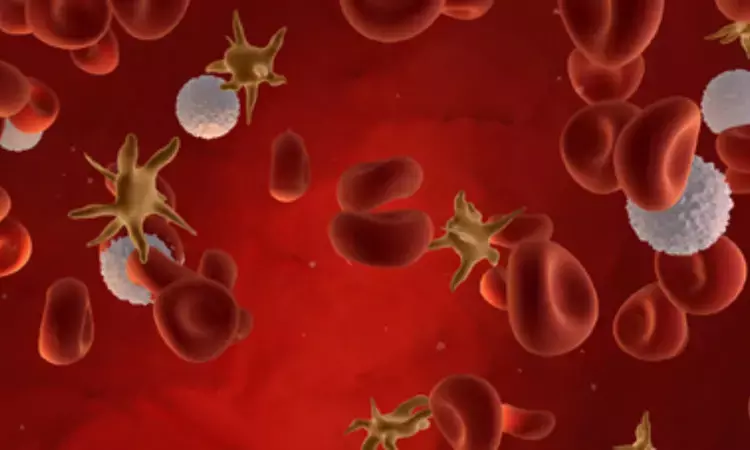- Home
- Medical news & Guidelines
- Anesthesiology
- Cardiology and CTVS
- Critical Care
- Dentistry
- Dermatology
- Diabetes and Endocrinology
- ENT
- Gastroenterology
- Medicine
- Nephrology
- Neurology
- Obstretics-Gynaecology
- Oncology
- Ophthalmology
- Orthopaedics
- Pediatrics-Neonatology
- Psychiatry
- Pulmonology
- Radiology
- Surgery
- Urology
- Laboratory Medicine
- Diet
- Nursing
- Paramedical
- Physiotherapy
- Health news
- Fact Check
- Bone Health Fact Check
- Brain Health Fact Check
- Cancer Related Fact Check
- Child Care Fact Check
- Dental and oral health fact check
- Diabetes and metabolic health fact check
- Diet and Nutrition Fact Check
- Eye and ENT Care Fact Check
- Fitness fact check
- Gut health fact check
- Heart health fact check
- Kidney health fact check
- Medical education fact check
- Men's health fact check
- Respiratory fact check
- Skin and hair care fact check
- Vaccine and Immunization fact check
- Women's health fact check
- AYUSH
- State News
- Andaman and Nicobar Islands
- Andhra Pradesh
- Arunachal Pradesh
- Assam
- Bihar
- Chandigarh
- Chattisgarh
- Dadra and Nagar Haveli
- Daman and Diu
- Delhi
- Goa
- Gujarat
- Haryana
- Himachal Pradesh
- Jammu & Kashmir
- Jharkhand
- Karnataka
- Kerala
- Ladakh
- Lakshadweep
- Madhya Pradesh
- Maharashtra
- Manipur
- Meghalaya
- Mizoram
- Nagaland
- Odisha
- Puducherry
- Punjab
- Rajasthan
- Sikkim
- Tamil Nadu
- Telangana
- Tripura
- Uttar Pradesh
- Uttrakhand
- West Bengal
- Medical Education
- Industry
Autologous platelet-rich plasma promising treatment for nonhealing perineal wounds

China: Patients recovering from hemorrhoidectomies often face challenges when it comes to healing perineal wounds. In some cases, these wounds fail to heal for an extended period, causing pain and discomfort for patients. To address this issue, researchers have turned to autologous platelet-rich plasma (PRP) as a potential solution for expediting wound healing. PRP contains a high concentration of platelets, which release growth factors that promote tissue regeneration and wound healing.
In a recent case study published in Wounds: A Compendium of Clinical Research and Practice by Rong Wang and colleagues, two patients with nonhealing perineal wounds were treated using autologous PRP. Both patients had been experiencing difficulties in wound healing for over two months following their hemorrhoidectomies. The PRP treatment involved collecting peripheral blood from the patients and processing it using a centrifugation system to obtain autologous PRP.
For one patient, the PRP was injected subcutaneously around the wound. The remaining PRP was activated into a gel using thrombin and calcium chloride. This gel was then applied to the wound surface and covered with dressings, with changes performed every five days. The other patient received external treatment with the autologous PRP gel, and dressing changes were administered after one week. Both patients underwent two rounds of PRP treatment. The results were remarkable. Within two weeks, both patients experienced complete recovery, with their wounds fully healed without the need for further intervention. The use of autologous PRP in these cases demonstrated its safety and efficacy in promoting perineal wound healing.
PRP treatment utilizes the regenerative properties of growth factors released by activated platelets. These growth factors facilitate tissue repair, reduce inflammation, and accelerate the healing process. As an autologous blood-derived product, PRP eliminates the risk of adverse reactions or rejection.
The findings from this case study provide valuable insights into the potential of PRP in perineal wound healing. Further research and larger studies are warranted to evaluate its effectiveness and determine optimal treatment protocols. With its promising results, autologous PRP holds great promise as an innovative approach to expedite the healing of nonhealing perineal wounds.
Reference:
Wang, R., Gao, H., Zhao, Z., Li, Y., Qin, L., Liang, S., Zhao, G., & Wang, H. (2023). Autologous platelet-rich plasma for the treatment of nonhealing perineal wounds: a report of two cases. Wounds: A Compendium of Clinical Research and Practice, 35(5), E169–E172. https://doi.org/10.25270/wnds/22077
Dr Kamal Kant Kohli-MBBS, DTCD- a chest specialist with more than 30 years of practice and a flair for writing clinical articles, Dr Kamal Kant Kohli joined Medical Dialogues as a Chief Editor of Medical News. Besides writing articles, as an editor, he proofreads and verifies all the medical content published on Medical Dialogues including those coming from journals, studies,medical conferences,guidelines etc. Email: drkohli@medicaldialogues.in. Contact no. 011-43720751


